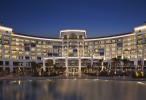The Saudi Entertainment Ventures Company (SEVEN) CEO Bill Ernest has revealed future plans and prospects for the region’s entertainment and leisure sector.
Ernest, a former Disney executive and entertainment sector veteran, is heading up SEVEN, which is fully owned by the Public Investment Fund (PIF).
SEVEN is behind the Kingdom’s first cinemas to open there in more than 35 years, in a partnership with US based AMC Group, the largest cinema operator in the world.
Ernest also sketched out SEVEN’s plans for a massive multi-cluster family-friendly entertainment destination in Riyadh. Each entertainment destination will feature a cinema, augmented reality activities, green open areas equipped for sports and aquatic activities, entertainment and live shows and dining venues.
The Riyadh destination is planned as the first of many such family-friendly destinations, as part of the Kingdom’s Vision 2030.

| Advertisement |
While delivering the keynote speech at the Middle East and North Africa Leisure & Attractions Council (MENALAC) Leisure, Entertainment and Attractions Conference 2019 in Dubai, held concurrently with the Dubai Entertainment & Leisure Show (DEAL), Ernest told delegates that Saudi Arabia’s travel and tourism sector accounted for some 65 billion dollars of the Kingdom’s total GDP in 2016. The sector already contributes more than the automotive, manufacturing, agriculture and banking sectors.
He said travel and tourism in the Kingdom sustained over one million direct, indirect and induced jobs in 2016, and that the sector expanded by a massive 38.2% between 1997 and 2016. Ernest said: "Our offerings will create exciting new roles for ambitious young Saudi nationals. We will need to provide training in new skill sets." He said SEVEN’s owners, the Private Investment Fund, expect the company's projects to serve more than 50 million visitors, provide more than 22,000 direct jobs and contribute to the GDP by approximately SAR 8 billion (US$2.13bn) by 2030.









 Search our database of more than 2,700 industry companies
Search our database of more than 2,700 industry companies









